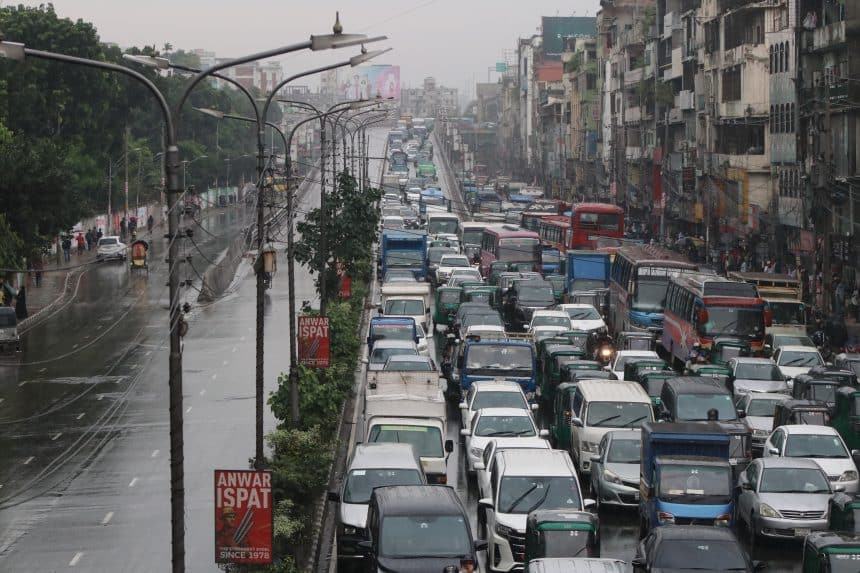The interim government has launched traffic signals to bring discipline to Dhaka’s city roads, relieving traffic police of maintaining traffic manually.
However, experts expressed doubt on its results as, over the last two decades, the past governments took up similar projects four times but failed to make traffic lights projects functional.
Dhaka’s experiment with automatic traffic signals started in 2001 under Dhaka Urban Transport Project funded by the World Bank. At a cost of Tk13 crore, 68 traffic signals were installed between 2001-2005 in the city.
The latest Dhaka Integrated Traffic Management Project took up by Dhaka Transport Coordination Authority (DTCA) in 2015 to bring Dhaka’s four crossings – Paltan, Phulbari, Mohakhali, and Gulshan-1 – under the Intelligent Transportation System at a cost of Tk52 crore. However, it too failed.
Professor Moazzem Hossain at the Department of Civil Engineering of Bangladesh University of Engineering and Technology is working as the consultant of the new project of installing traffic lights at the seven important intersections from hotel InterContinental to Airport in the city.
He said that though they are calling it a pilot project it is now operational and later they will expand it. He said that at a single intersection, there are around 10 police personnel deployed but after the installation of the traffic signal, the number of police deployment will come down to two or three.
Prof Moazzem Hossain said that in the past there were no backups for operating 24/7, in addition no organisation owning up to the responsibility for these traffic signals.
He said that the speciality of the new project is that the traffic lights system has been developed domestically and they will not have to depend for spare parts on import.
Priority not to reduce traffic congestion
Professor Moazzem Hossain said that they are not prioritising traffic congestion by installing traffic lights at the seven points from hotel InterContinental to Airport intersections.
“Even after bringing order, there is no reason to think that the roads will become congestion-free. If that were the case, there would be no traffic jams in London – yet they have had traffic signals for a very long time, with around 1,000 signals in place,” said Prof Moazzem.
He said that even after implementing the signal system, some level of traffic jams will remain here because the demand is very high.
“Our main target is to bring order to traffic. The congestion that happens – that also happens in London, in Paris, in Los Angeles – and in Dhaka the traffic volume is even higher compared to the road space,” said Prof Moazzem. “The difference will be that an environment of discipline and rule-following can be created – if we can make that happen.”
Moazzem said that all over the world, traffic signals are controlled through signal lights automatically. It is not controlled manually as it is in Bangladesh.
Transport expert Prof Shamsul Hoque said that traffic signals are effective only when there is existing order and discipline on the roads, as signals cannot create order where chaos reigns.
“Similar projects with advanced technology and foreign experts have been implemented four times since 2005 but ultimately failed because the fundamental problem of vehicular and pedestrian disorder remained unaddressed,” said Prof Shamsul Hoque.
He said that signals never actually bring order to the roads. It is a misconception to think that installing signals will automatically restore discipline on the streets.
“But many people believe that if signals are installed, buses will become orderly, pedestrians will stop crossing haphazardly, cars will no longer park at intersections,” said Prof Shamsul Hoque.
The government should take initiatives to bring discipline in other ways too.
“If buses were run under a proper franchise system, if the number of motorcycles were reduced, and if easy-bikes and rickshaws were removed from the main roads, then traffic would flow smoothly and there wouldn’t even be a need for signals,” said Shamsul Hoque.
Adil Muhammad Khan, president of Bangladesh Institute of Planners, said that in Dhaka city, several rounds of investment have already been made for this. But in every case, the traffic signals have failed – and the reasons for the failure are also predictable.
“The city lacks road discipline, lacks management, and lacks pedestrian road behaviour. Our drivers do not follow proper road behaviour. With enormous traffic load, if we implement traffic signals at only a few points, they will not really function for very long.”


